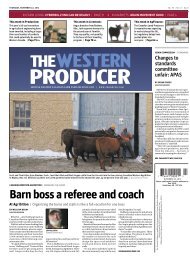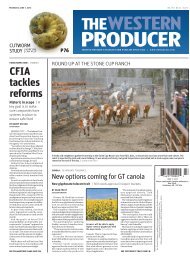You also want an ePaper? Increase the reach of your titles
YUMPU automatically turns print PDFs into web optimized ePapers that Google loves.
MANAGING THE FARM<br />
ANDREW RAPHAEL<br />
Farmers are often advised to<br />
add value to the livestock and<br />
crops they produce, which can<br />
mean looking at value-added food<br />
processing.<br />
It can be a profitable strategic move,<br />
but many issues must be considered<br />
when producing prepared food. As<br />
we’ve seen with XL Foods, food safety<br />
is one of the most critical.<br />
However, all the costs related to<br />
small-scale food processing mean<br />
investing in food safety can be a challenge,<br />
particularly when the money<br />
could be used to adhere to new<br />
changes in federal packaging regulations,<br />
improve efficiencies, strengthen<br />
sales margins and increase market<br />
share.<br />
Food safety should always be a priority.<br />
It’s the right thing to do. However,<br />
the reality is that consumers are<br />
often not aware of this investment<br />
and therefore it’s not always top of<br />
mind for food processors that may<br />
have many competing challenges<br />
requiring investment of scarce<br />
resources.<br />
<strong>The</strong> federal government has established<br />
programs under the Canadian<br />
Integrated Food Safety Initiative to<br />
help national organizations.<br />
However, these programs do not<br />
directly help processors buy the<br />
equipment they need, train staff or<br />
get certified against customer<br />
requirements.<br />
Provincial programs vary greatly<br />
across the country in terms of scope<br />
and eligibility criteria. <strong>The</strong>y are also<br />
AGFINANCE<br />
THE WESTERN PRODUCER | WWW.PRODUCER.COM | DECEMBER 13 , 2012<br />
FOOD SAFETY | INDUSTRY INCENTIVE<br />
Time to introduce tax credit to upgrade food safety<br />
Tax credit would<br />
encourage processors<br />
to invest in food safety<br />
FINANCE NOTES<br />
RIDLEY EXPANDS<br />
Feed maker Ridley Inc. of Winnipeg<br />
has bought Stockade Brands Inc., a<br />
Kansas maker of mineral blocks,<br />
loose minerals and dried molasses<br />
for livestock. <strong>The</strong> deal was handled<br />
through Ridley Block Operations, a<br />
division of Ridley.<br />
Established in 1946, Stockade operates<br />
from a single production facility<br />
in Pittsburg, Kansas, centrally located<br />
within one of the most dense cowcalf<br />
areas in the United States, Ridley<br />
said in a news release.<br />
<strong>The</strong> purchase price was not released.<br />
BASF BUYS UNDERWOOD<br />
BASF has completed its purchase of<br />
Becker Underwood, a maker of biological<br />
plant health products including<br />
inoculants and seed treatments.<br />
<strong>The</strong> deal, announced in September,<br />
is worth $1.02 billion.<br />
Becker Underwood has Canadian<br />
connections.<br />
In 2000, it bought MicroBio Group,<br />
which owned Saskatoon inoculant<br />
FILE PHOTO<br />
administratively cumbersome for<br />
small businesses and offer minimal<br />
assistance.<br />
Government and businesses need<br />
to work more closely to enact practical<br />
food safety regulatory oversight<br />
matched by industry investment in<br />
the infrastructure, equipment and<br />
technology required to meet the rising<br />
expectations of customers, regulators<br />
and consumers.<br />
Implementing a time-limited federal<br />
food safety tax credit would provide<br />
a simple, uniform, national<br />
financial incentive for food processors<br />
of all sizes, in all commodity<br />
sectors and in all regions.<br />
A food safety tax credit could<br />
adopt the best aspects of the current<br />
Scientific Research and Experimental<br />
Development tax credit<br />
(SR&ED), allowing eligible companies<br />
to earn a credit of 35 percent on<br />
the first $3 million of qualified<br />
expenditures for food safety investments<br />
and 20 percent on any excess<br />
amount.<br />
A food processor with a taxable<br />
income in the immediately preceding<br />
year that does not exceed the<br />
business limit ($500,000 in taxable<br />
income) would receive a portion of<br />
the investment tax credits (ITCs)<br />
earned as a refund, after applying<br />
these tax credits against taxes payable.<br />
As with SR&ED, unused tax credits<br />
maker MicroBio RhizoGen Corp.<br />
Becker Underwood has 10 production<br />
sites around the world and<br />
employs 479 people.<br />
BASF’s crop protection division will<br />
create a new business unit called<br />
Functional Crop Care, which will<br />
incorporate BASF’s activities in seed<br />
treatment, biological crop protection,<br />
plant health and water resource<br />
management with those of Becker<br />
Underwood.<br />
Becker Underwood’s animal nutrition<br />
business will go into BASF’s<br />
nutrition and health division.<br />
CWB SHIPS CANOLA OVERSEAS<br />
WINNIPEG (Reuters) — CWB said<br />
it has made its first overseas shipment<br />
of canola, marking its first<br />
diversification into crops outside of<br />
wheat and barley.<br />
CWB dispatched 42,000 tonnes of<br />
canola to Japanese customers via<br />
Prince Rupert, B.C.<br />
It said it bought the canola from<br />
grain companies and farmers on the<br />
cash market, as well as through its<br />
pooling program for farmers.<br />
could be carried back for three years<br />
and forward for up to 20 years.<br />
Tax credits are an effective way to<br />
influence the economic choices of<br />
businesses and individuals in support<br />
of government policy objectives.<br />
Tax credits reduce the cost of<br />
investment without limiting the<br />
choice of technology or services.<br />
It also applies regardless of which<br />
jurisdiction has regulatory responsibility<br />
for the plant and doesn’t have<br />
the limiting and bureaucratic features<br />
of grant programs.<br />
<strong>The</strong> cost in foregone taxes is difficult<br />
to determine because the program<br />
will be demand driven.<br />
However, using the costs of the<br />
SR&ED program as a guide, 2004<br />
government data shows that 19,600<br />
corporations took advantage of<br />
SR&ED tax credits at a total cost of<br />
$3.4 billion. This suggests an average<br />
cost of $170,000 for each participating<br />
firm.<br />
Based on this, the annual cost<br />
would be $170 million if 2,000 firms<br />
took advantage of the program and<br />
received 50 percent of the average<br />
SR&ED benefit.<br />
This proposed food safety initiative<br />
could also help reduce government’s<br />
health care costs associated with<br />
food-borne illnesses while assisting<br />
the Canadian Food Inspection<br />
Agency to streamline its operations.<br />
Inspection will succeed only if<br />
matched by more investment by<br />
industry to prevent problems rather<br />
than react to them after the fact.<br />
Canadian food processors of all<br />
sizes are under enormous financial<br />
pressure, urgently trying to comply<br />
with government regulations and<br />
93<br />
reduce operating costs to survive in<br />
the short-term while modernizing<br />
and scaling up operations to grow<br />
over the long term.<br />
At this time, a food safety tax credit<br />
would provide a simple, uniform<br />
incentive to help companies keep<br />
food safety a high priority as critical<br />
business decisions are made.<br />
Trust is like a mirror. Once it’s broken,<br />
you can never look at it the same<br />
again.<br />
A food safety tax credit would help<br />
reinforce the sacred trust between<br />
the Canadian agri-food chain and<br />
consumers, a trust that processors<br />
need to think about every day.<br />
Andrew Raphael is director of food and ag<br />
manufacturing with MNP. Contact Raphael at<br />
andrew.raphael@mnp.ca<br />
We’ve built<br />
a better midge trap.<br />
AC ® AC Shaw VB MIDGE TOLERANT WHEAT<br />
® Shaw VB MIDGE TOLERANT WHEAT<br />
Best midge tolerance<br />
Highest yielding CWRS in Sask Seed Guide<br />
Get AC ® Shaw VB today, only from SeCan.<br />
Developed by Agriculture & Agri-Food Canada, Winnipeg.<br />
‘AC’ is an official mark used under license from Agriculture & Agri-Food Canada.<br />
Genes that fit your farm® is a registered trademark of SeCan.<br />
*Based on the economic threshold of one midge per 4 to 5 wheat heads<br />
at flowering = estimated 15% yield loss if not controlled. Higher midge levels<br />
can lead to greater losses. 15% X 40 bu/acre X $6.00/bu wheat = $36.00.<br />
Genes that fit your farm. ®<br />
866-665-7333<br />
www.secan.com








